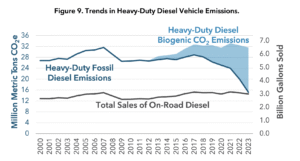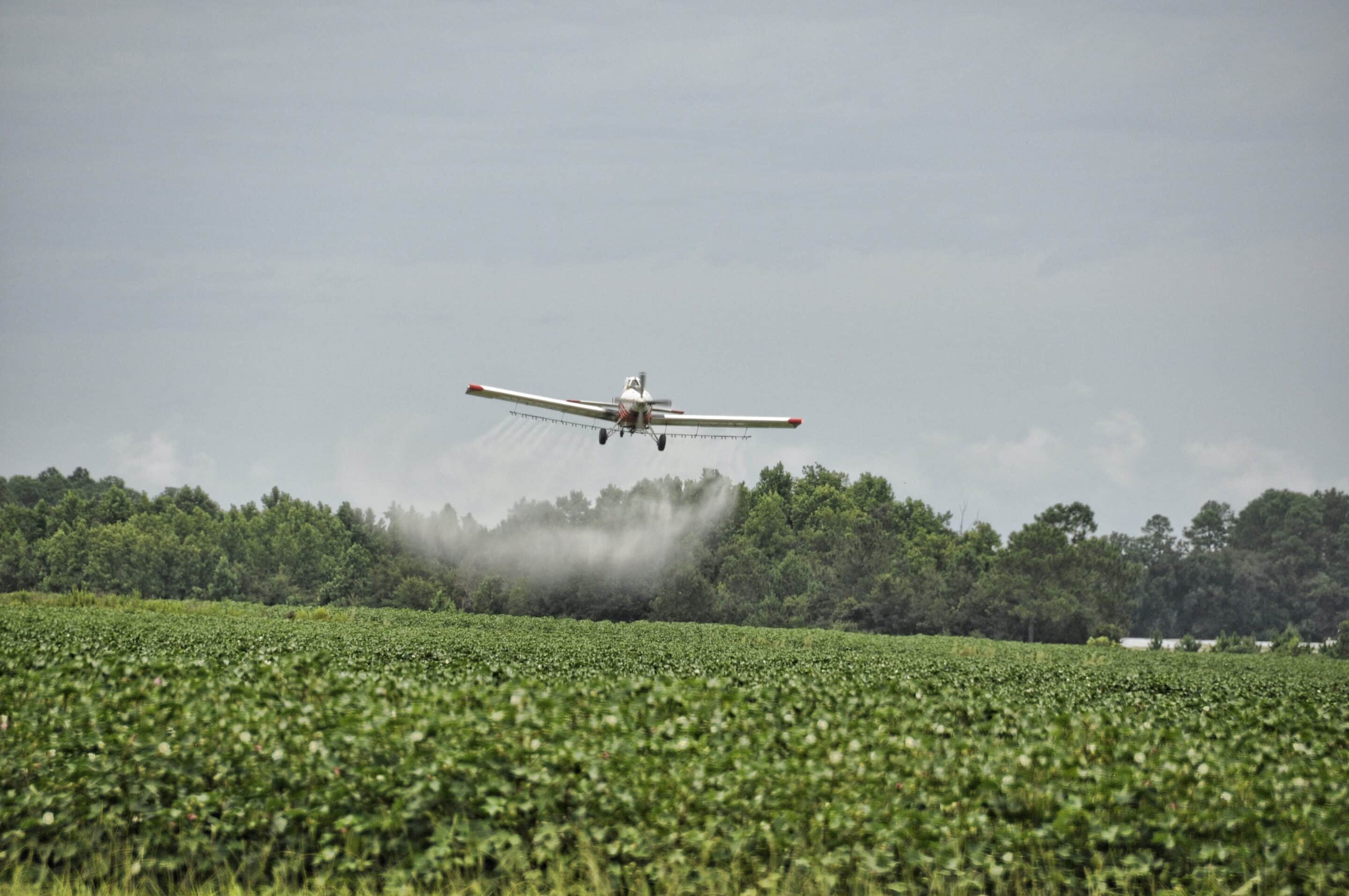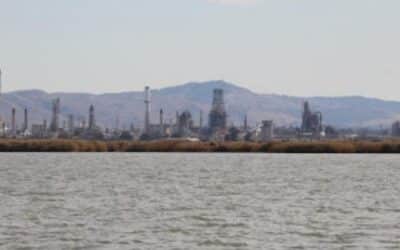California relies on counting uptake of ‘renewable diesel’ as a primary mechanism for achieving greenhouse gas emissions reductions, despite evidence showing that biofuels are anything but ‘carbon neutral’ and can result in even more emissions than fossil fuels.
CARB RELEASES GHG DATA FOR 2023 IN NOVEMBER 2025
The California Air Resources Board (CARB) has recently released the state’s most recent edition of the annual Greenhouse Gas Emissions Inventory (GHG Inventory). Traditionally there is typically a year and a half delay between the end of the year covered by the emissions inventory data and the release date of the inventory. The data for the 2025 edition of the CARB GHG inventory therefore covers emissions for the year 2023. In each annual edition of the GHG Inventory CARB measures year-on-year emissions reductions. The 2025 edition of the GHG Inventory is designed to describe the emissions reductions from 2022 to 2023.
CARB CLAIMS EMISSIONS REDUCTIONS FROM UPTAKE OF RENEWABLE DIESEL
The year-on-year emissions reductions from 2022 to 2023 that CARB is claiming are a rather modest 11.2 million metric tons of carbon dioxide equivalent (MMTCO2e). Out of this 11.2 MMTCO2e of emissions reductions in 2023 compared to 2022 a bit less than half is attributed to the continued growth in the uptake of ‘renewable diesel’ in the transport sector. A total of 5.1 MMTCO2e emissions reductions are directly attributed to the burning of the ‘renewable diesel’ drop-in liquid biofuel product in the place of burning petroleum-based diesel. This 5.1 MMTCO2e of emissions reductions attributed to burning ‘renewable diesel’ in heavy-duty vehicles is about 45% of California’s claimed emissions reductions in 2023.
CARB HOSTS PUBLIC FORUM THAT EXPOSES FLAWED BIOFUELS EMISSIONS ACCOUNTING
In November 2024 members of the board of directors of CARB voted to approve new amendments to the Low Carbon Fuel Standard (LCFS). Included in the approval of the LCFS amendments was a requirement for CARB staff to host a public forum to revisit the science around biofuels and land use change. In this forum, held on November 6, 2025, extensive empirical evidence was shared that described how biofuels contribute significantly to the dynamics of commodity driven deforestation. The available science is unequivocal in associating the increase of production and consumption of biomass-based biofuel products like ‘renewable diesel’ as contributing to global forest loss. The forum offered presentations that irrefutably showed how the modeling and carbon accounting methodology that CARB relies on to characterize ‘renewable diesel’ as ‘carbon neutral’ has little scientific validity.
However, in the CARB GHG Inventory the emissions reductions attributed to the uptake of ‘renewable diesel’ are predicated entirely upon the premise that ‘renewable diesel’ is carbon neutral, and that burning ‘renewable diesel’ in heavy-duty vehicles in lieu of burning petroleum-based diesel results in a one for one emissions reduction. Note that ‘renewable diesel’ is chemically identical to petroleum-based diesel, and that the real-world emissions from burning ‘renewable diesel’ obviously exist. CARB even graphically shows how the actual consumption of diesel fuel products in California has remained essentially stable – but by considering ‘renewable diesel’ as ‘carbon neutral’ CARB is able to count the emissions from burning ‘renewable diesel’ as emissions reductions.

All of the light blue “Heavy-Duty Diesel Biogenic CO2 Emissions” are the emissions that CARB claims are being reduced – even as CARB explicitly describes how those emissions are occurring. This graph shows the 5.1 MMTCO2e emissions reductions claimed by burning ‘renewable diesel’ in 2023. Because of the characterization of ‘renewable diesel’ as being ‘carbon neutral’ CARB claims that those emissions from burning ‘renewable diesel’ do not exist.
ILLUSORY EMISSIONS REDUCTIONS AT THE HEART OF CALIFORNIA GHG ACCOUNTING
Despite the real-world evidence exposing liquid biofuels as a driver of global deforestation, California’s state authorities have been doubling down on promoting the uptake of ‘renewable diesel’ and other biofuel products as being a central pathway to achieving the state’s climate objectives. Nevertheless, the science shows that ‘renewable diesel’ is not carbon neutral, and likely results in more overall GHG emissions than does petroleum-based diesel. The sobering conclusion is that California is relying on illusory emissions reductions to claim progress on climate: at least 45% of 2023 emissions reductions claimed in the latest CARB GHG Inventory only exist on paper. The double-edged sword of biofuels is exposed: global forests fall, making the climate and biodiversity crisis worse, while California claims illusions as emissions reductions, wasting time with liquid biofuel pathways that lead straight into a climate dead end.
BiofuelwatchBriefing_IllusoryEmissionsReductionsBiofuelsCalifornia


